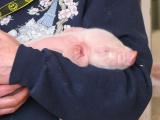Apr 11, 2012
Novel H3N2 flu case reported in Utah
Health officials in Utah today announced that a Weber County resident has tested positive for a novel reassortant H3N2 (H3N2v) influenza virus, the same strain that sickened 12 patients last summer and fall in five other states. A press release from the Weber-Morgan Health Department (WMHD), based in Ogden, said tests by the US Centers for Disease Control and Prevention (CDC) and the Utah Department of Health (UDH) confirmed the finding. The swine-origin H3N2v strain includes the M (matrix) gene from the pandemic 2009 H1N1 (pH1N1) virus. Gary House, MPH, director of the WMHD, said in the statement that the CDC and Utah officials are trying to determine how the individual was exposed to the virus. He said the patient was not hospitalized and has recovered at home. The patient's contacts have been asked to report any flu-like symptoms. He advised the community to take routine flu-prevention precautions such as covering coughs and sneezes, staying home when sick, and washing hands frequently.
Apr 11 WMHD press release
India's health ministry finds no worrisome H1N1 changes
India's Ministry of Health and Welfare today addressed reports of rising numbers of 2009 H1N1 flu cases reported from some states, noting that outbreaks are under control and that there is no sign that the virus has changed or become more virulent. Over the past 2 months, India has reported increasing numbers of infections, with some deaths, which have spurred some sensationalized media reports, reports of traveler screening, and worries that the virus may have changed. The ministry said in a press release that an analysis by the National Institute of Virology in Pune determined that the circulating strains belong to clades 6 and 7, which is circulating in many countries and responds to oseltamivir (Tamiflu). It said the currently available vaccine can be used, because antigenic differences between the vaccine strain and the circulating strain are not significant. The ministry said the World Health Organization (WHO) had predicted that the 2009 H1N1 virus would circulate like a seasonal virus and added that since the pandemic period, India has had three outbreaks involving the strain. States reporting an increasing number of cases include Andhra Pradesh, Maharashtra, Rajasthan, Karnataka, and Tamil Nadu. The ministry said most patients with H1N1 infections will have mild symptoms that don't require treatment, but it urged those with moderate symptoms and those with underlying risk factors to seek evaluation. Oseltamivir is readily available and no travel restrictions are needed, the ministry said.
Apr 11 Indian government press release


















